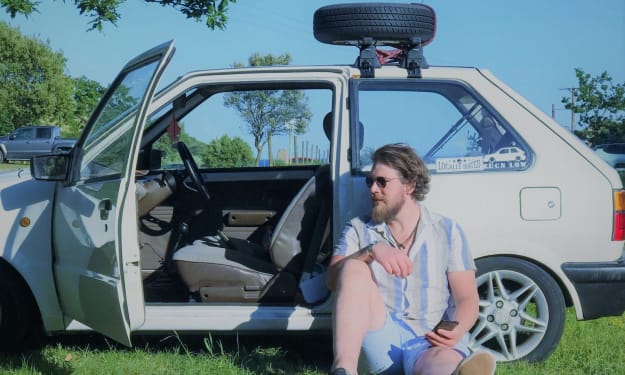
I'd always known that my grandfather was a good man, well respected but humble. He was a real Devon boy with a flick on the ear in moments of misdeed that was more potent than a kick from the hoof of a cart mule.
It took me longer to realise that he was a truly kind man as well. Selfless in all.
My sister, my mother and I moved into the big old house he called home (and that his elders had called home and that their elders called home, you get the idea) when I was just seven. For me it was a magical place, the giant Georgian windows would fill the lower floor with sunlight that could charge the soul and blankets my memory of those days in a golden haze. I can still remember the waft of burning toast and fresh coffee emanating from the grand kitchen before the world woke. I can still hear familiar and unfamiliar voices climbing the staircase on one of those everlasting summer evenings. the sound of the Trixie, our favourite pooch, excitedly bouncing her paws of the stable door in anticipation as another guest swung open the garden gate with a distinctive, drawn out squeak before it closed with a wrought iron rattle behind them. The halls hummed with the hustle and bustle that old houses always tend to have. But most of all I remember grandpa, and all the little things he did to make it a home to everyone, not only us.
The tasks begin
It was a morning like most others, and as would usually be the case on a Saturday morning, I crawled down stairs wrapped in an old wool blanket to see if I could muscle my way through the aprons and morning trousers hoping to beat Trixie to the stove and whatever fragrance had woken us. And that's when a new call came, “aah, we were wondering when you'd realise” my grandmother said with a gentle smile as she stood over the stove, her favourite mug in one hand and a striped tea towel in the other, “Go on then, the teas on, ask everyone how they’ll have it”. I obliged, excited to take part in the weekly ritual and with a sense of pride strolled right up to the chattering mass. When I arrived, I found that I recognised only a few of the faces sitting around the great oak table. Grandpa was first on my little list. He could see I was unsure of the others so lifted me onto his knee in order to introduce me to the rest, “‘Ello lad” he boomed in his thick Devonshire accent, “Everyone this ‘ere’s my grandson Freddy. Freddy, this Martin and there's Mike and Rita, and umm...”. Each introduction was met with a firm nod and a smile from the men and an “‘Ello my darlin' ' from the women. Those who hadn't been named started to introduce themselves. “Grandma wants to know what you want” I replied, prompting a few confused looks from the group. “Tea?” said one, and the others followed. “Aaah, two sugars for me lad” came the voice of another. “Oooh, go on ‘en, I’ll ‘ave one” came a third voice. I gathered the orders in my mind and, still wrapped in itchy wool, bounced over to grandma to relay the information.
This tradition would continue week after week, month after month, year after year. Always with new faces to see, new names to remember and new stories to be told. Each time I was trusted with a task more prestigious to me than the last. For it was his way, if you had nowhere to go, then go with grandpa. With every new face, he took the utmost care to understand them, listen to them. He would sit, smile and nod until all of your worries were laid bare and dissolved into Ether.
I remember well the day I had fortune to discover this first hand .When I was a young lad, I grew and grew, up and out. I towered over my classmates, my mother, and most of my family. As is so often the case, some of the other children had taken a firm dislike to me at an early age, I was different. I would trudge home with my head hung low, tears streaming from my grubby face. I would never say what was wrong, but instead, I would loathe myself and my differences with the naïve belief that I was alone in this.
It had been one of those days, a frigid winter evening, where the drizzle soaks your bones and gnaws your cheeks that grandpa called for me, his stoic voice rumbled from the top of the winding wooden staircase. “Freddy, is that you in?” he said. “Uhh, yeah” I barked back. “Come ‘ere lad, I've got somit’ to show you”
To quench my curiosity, I crawled up a stair at a time. He stood in his bedroom door, dressed in a worn, un-ironed shirt tucked into equally ancient woollen trousers pulled up past his waist. A firm gesture told me that I was to sit in the wheelback chair beside his bed. I obliged.
“Where's it gone, I know it’s ‘ere somewhere”, he muttered as he parted the old smoking jackets and checked shirts that hung inside the armoire. “Ah!! Got it!” Grandpa stood upright (well, as upright as he could) and shuffled over to the bed. In his hands he clasped an old shoebox, caked with dust and looking as though it must have spent some of its life as a foot stool. I stayed silent, the rain fogged the window and distorted Yew trees as if to show empathy. Grandpa lowered himself with great ache and many an old man noise beside me and carefully liberated the contents of the cardboard crate.
Inside, were treasures. There were coins from China and marble from monuments. There were dog tags from forgotten adventures and bottle caps from scorching summers afternoons long ago, real treasure. From amongst the casket of memories, grandpa pulled out a faded, monotone, photograph no bigger than a matchbox. “‘Ave a look at this,” he handed the photograph to me. A young, rotund, child stood in the image, he was slanted beside a pigeon loft in the garden I knew well (of course the pigeons were long gone, but the oaks and ash, while much wiser, remained). “Who is it?” I asked, for while I felt I knew, I didn't feel I could say. “Well... It's me, when I were a lad”. I lifted my gaze, squinting, for while his face had aged, his eyes were the same. “You see, when I were your age I was just like you”. The tears that had felt as though they might give the rain some competition if they ever gathered the muster to burst out, now had a reason to recede. That was all I needed and he knew it. He went on, “I know it feels rubbish now, but you're not alone you know”. I smiled. I hugged him.
It wasn't long however, before the hounds came back. Grandpa, you see, was an eternally ill man; he'd had a bleed on the stomach in his thirties and never really recovered. Life for him was ever plagued with cancer, a weak heart and bad blood. A family curse by all accounts. His last rights had almost become a running joke. But when his legs began to shake and his back grew weak, he begrudgingly adopted an ash cane. His head sunk lower and stride became a shuffle but nevertheless, he went on. every Tuesday morning, no matter how his bones ached, a tweed flat cap was donned and with his now slender frame draped in wool and pock marked polyester from a dozen lost cigarettes, he ambled toward the next village to tick those lonely souls off of his list, house by house each time slower than the last. There were always more to listen to and always more to laugh with.
Eventually, the day came, as it always does. The church buzzed with the sounds of the familiar and the unfamiliar voices alike, just as the halls of that great house had for decades before. The isles were jam-packed with people. There were stories and faded photographs shared in every corner, from a young man in army uniform standing in front of then President Nixon to monochrome vistas of Hong Kong and what seemed to be everything between. I figure grandpa’s Christmas card list must have been more verbose a document than the doomsday book. But within all the noise there was an overwhelming echo; what he had done for us, How had none known just how much? You see, it was in the little moments that he shone the brightest. When he took the time to let you know that you weren't climbing the mountain alone. This played over and over in many actions for many people, whether he was visiting those who couldn't get out and had no one left to talk to or teaching someone to fish, and then realising he couldn't fish but carrying on regardless or even if it was just listening to the salesmen or to the guy on the bus when no one else would.
As is right, he had never spoken of his charity work. To him, it was just a part of the distinctly human duty that binds us. I believe if he were here today he’d tell us to do the little things, be the diplomat when it's the hardest person to be and lend your ear to those with voice. But most importantly, don't ask for thanks or give a thought to how it may look to others. Make the choice to be more like those good people we have lost, because, when it boils down to it, the lives we change with the smallest of good deeds along the meandering road of our individual lives and a world that's better for it, that's the real legacy.
If you liked this story and would like to read more like this, let me know by liking at the bottom of this page.






Comments
There are no comments for this story
Be the first to respond and start the conversation.